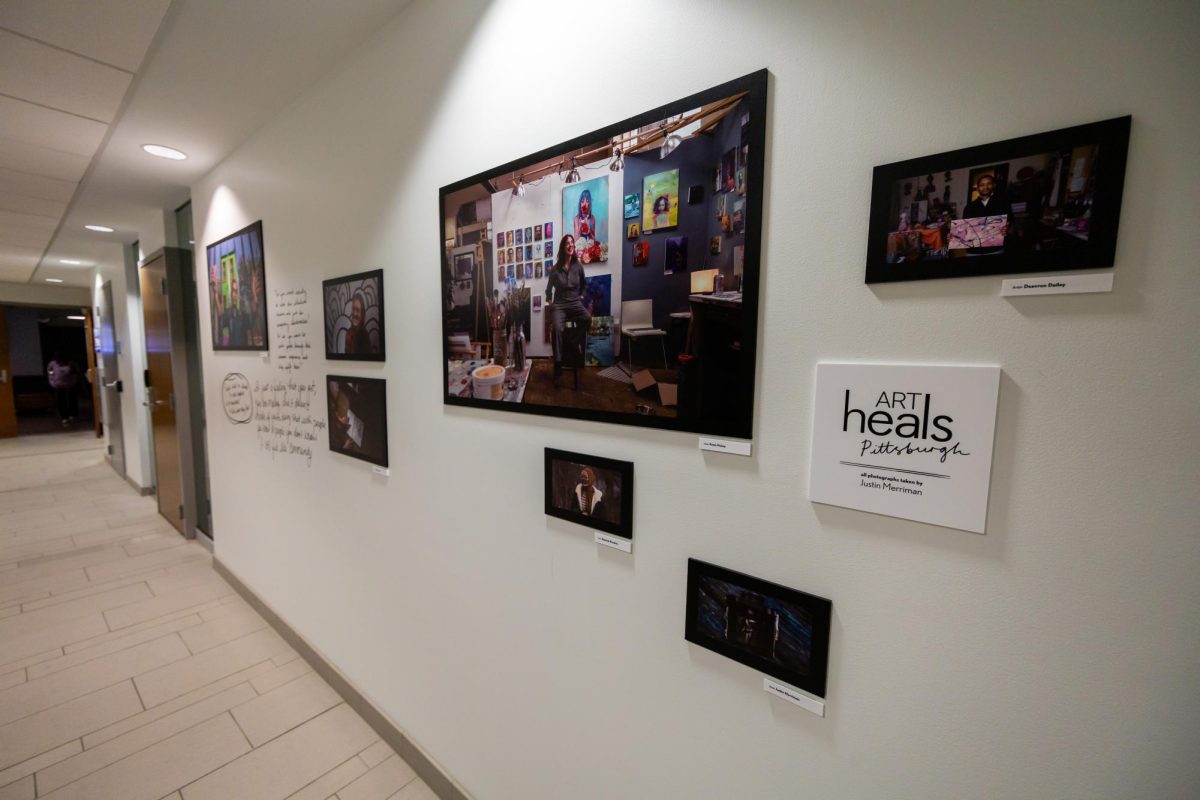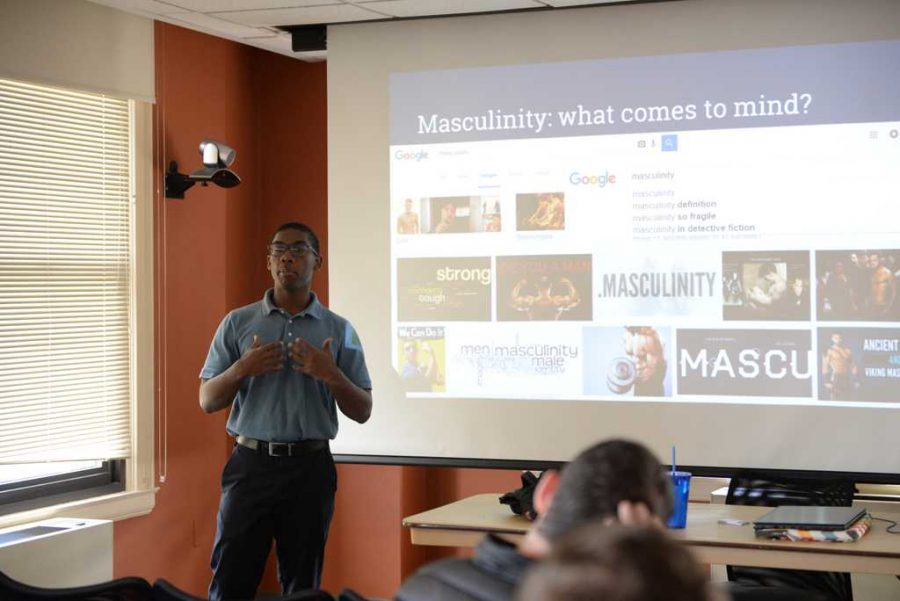When T. Leon Williams lectured at Pitt, he asked the audience members to stand if they had never talked about masculinity in their households.
Nearly everyone in the audience rose.
“We don’t have conversations about masculinity, manhood,” Williams, a campus pastor and former multicultural center director at Elon University, said. “We’re here because we have some issues, we have some challenges.”
Williams’ lecture was part of the Interfraternity Council’s first-ever Healthy Masculinities Week at Pitt, a six-event series of lectures, discussions and a documentary screening last week designed to chip away at concepts of “toxic masculinity” — the product of societal pressure on men to fit into an aggressive, domineering mold.
IFC, the governing body for Pitt’s social fraternities, hosted the series from March 14 to 20, partnering with Campus Women’s Organization, Rainbow Alliance and sororities Sigma Delta Tau and Zeta Beta Tau for several of the week’s events. IFC President Justin Horowitz, who proposed and spearheaded the series, said the series is Pitt’s first formal event on the topic of toxic masculinity.
The series, Horowitz said, was the beginning of what he hopes will be a continued conversation about the pressures society places on men and the problems this creates in society and on Pitt’s campus. The week opened discussions about manhood that will help students embrace masculinity in productive and engaging ways, according to CWO President Suzy Hinkle.
“Often, you can see people claiming their masculinity in very antagonistic ways,” Hinkle said. “I think that this is raising awareness about the very different shades of masculinity and how masculinity does not have to be a very one-dimensional concept.”
Williams’ lecture about the importance of open, healthy discourses on masculinity — the largest Healthy Masculinities Week event with about 150 attendees — continually called on male students to answer questions sincerely by taking off their “masks” of exaggerated machismo and embracing their natural behavior.
”This was about change. This whole week on this campus is about healthy masculinity,” Williams said. “Fellas, we have to take the mask off so we can get to know each other.”
Horowitz said the week was meant to encourage men to feel comfortable in their own skins, regardless of whether or not they fit the prototypical ideal of manliness. Horowitz and the IFC are already talking about plans for next year’s series.
“We see healthy masculinity as a form of masculinity where men are able to be themselves 100 percent of the time,” Horowitz said. “Right now there’s so much pressure from society about how a man is supposed to act, how they’re supposed to look, what they’re supposed to say, and it’s very harmful.”
Hinkle echoed Horowitz’s thoughts and said these pressures contribute to sexual assault and the formation of rape culture.
“Masculinity is more about being aggressive, rather than asking for permission,” Hinkle said. “It seems like men are taught that they are to be respected, and that their needs are really more important than the needs of others. I think that really plays a lot into rape culture.”
Gabby M.H. Yearwood, visiting lecturer in Pitt’s anthropology department, said part of the driving force behind rape culture is the idea that men are supposed to be dominant and aggressive, which leads to a culture of “male privilege.”
“Male privilege means you have free and open access to women, which means there’s no such thing as ‘No’ from this particular male perspective,” Yearwood, who is also an affiliated faculty member with the Gender Studies and Women’s Studies department, said.
These internalized beliefs can lead to sexual assault and rape, though Yearwood said the same perspective is also manifested in microaggressions, such as checking out women or catcalling.
Discussion about masculinity may lead to a wider acceptance of various forms of masculinity, Horowitz said, allowing men to resist social pressures to act aggressively or forcefully within the hookup culture on college campuses.
”I think that if we can help men feel more comfortable being themselves, then hopefully this rape culture will diminish,” Horowitz said.
Yearwood said it may be difficult to start this conversation, in part because men are taught not to openly discuss their emotions.
“Part of something that’s the definition of being male [is] young boys are encouraged throughout their lives to not talk about their feelings or emotions,” Yearwood said. “Most don’t have the tools to be able to do it.”
First-year student Sam Flynn, who attended Williams’ lecture, said the lecture will get people talking among themselves.
“I think a lot of guys could use some help understanding what masculinity is,” Flynn said. “It’ll be hard to get it rolling, but it’ll start conversation in friend groups.”
Yearwood said societal pressures can be particularly strong for young men and boys, forcing them to conform and modify their behavior before they feel accepted.
“It’s hard to resist what society tells you to be, in the same way that that happens with young girls,” Yearwood said. “What society pushes on them, not all boys actually want.”
Despite social pressures, Yearwood said not all men hold the perspective of “male privilege,” though all men need to discuss their manhood in order to create a more positive general discussion about masculinity.
Bree Higginbottom, a junior chemistry major and sister of Sigma Delta Tau, attended Williams’ lecture and isn’t so sure people want to start talking about masculinity.
“I feel like not a lot of people on this campus want to change,” Higginbottom said. “There are a small group of us pushing for change.”
As part of the push for change, Higginbottom’s sorority co-hosted the final event of Healthy Masculinities Week on Sunday evening. The event, “Safe Smart Dating,” broke attendees into small groups to discuss issues of dating violence and sexual assault.
Horowitz said none of the events were mandatory for any of the fraternities, but event attendance did count toward each fraternity’s completion of the Cathedral Standards of Excellence, a mandatory program requiring on-campus fraternities to attend a number of varied events.
Although Healthy Masculinities Week started discussion about manhood, Horowitz said it will take extended discussion for real changes to take place.
”I hope the conversation continues even after this week,” Horowitz said. “It starts here. I think that [in] our generation, we can really help fix this issue — or I hope we can.”



